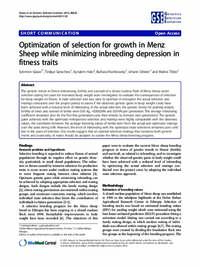Optimization of selection for growth in Menz Sheep while minimizing inbreeding depression in fitness traits

Authors:
The genetic trends in fitness (inbreeding, fertility and survival) of a closed nucleus flock of Menz sheep under
selection during ten years for increased body weight were investigated to evaluate the consequences of selection
for body weight on fitness. A mate selection tool was used to optimize in retrospect the actual selection and
matings conducted over the project period to assess if the observed genetic gains in body weight could have
been achieved with a reduced level of inbreeding. In the actual selection, the genetic trends for yearling weight,
fertility of ewes and survival of lambs were 0.81 kg, –0.00026% and 0.016% per generation. The average inbreeding
coefficient remained zero for the first few generations and then tended to increase over generations. The genetic
gains achieved with the optimized retrospective selection and matings were highly comparable with the observed
values, the correlation between the average breeding values of lambs born from the actual and optimized matings
over the years being 0.99. However, the level of inbreeding with the optimized mate selections remained zero until
late in the years of selection. Our results suggest that an optimal selection strategy that considers both genetic
merits and coancestry of mates should be adopted to sustain the Menz sheep breeding program.
